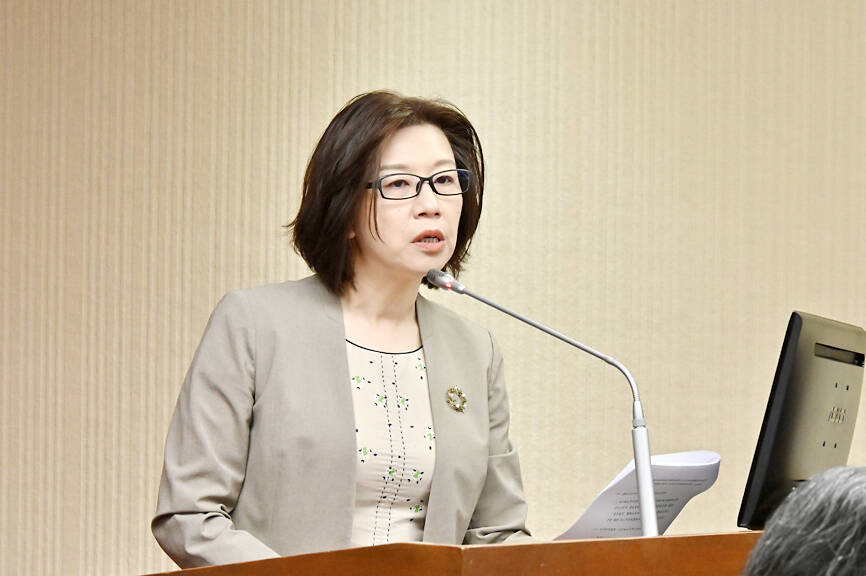Fostering flexible workplace environments and encouraging men to participate in childcare are key to boosting birthrates, as it is mostly women who face challenges in balancing careers and family planning, Deputy Minister of Health and Welfare Lin Ching-yi (林靜儀) said yesterday.
Minister of Health and Welfare Chiu Tai-yuan (邱泰源) on Saturday last week outlined four strategies to address the nation’s declining birthrate.
They were: reducing the burden of childcare, improving mother-child health, funding more childcare facilities and public housing for new parents, and increasing people’s willingness to get married and have children, Chiu said.

Photo: George Tsorng, Taipei Times
Chiu said encouraging matchmaking activities could help with the last strategy, which drew public criticism.
Developed countries often face declining birthrates, as people have more choices regarding their life path, Lin told reporters before attending a hearing of the Legislative Yuan’s Social Welfare and Environmental Hygiene Committee.
The ministry has been promoting family-friendly environments, subsidies for assisted reproduction and supportive workplaces so that families with children or who want children can have social support, she said.
It is mostly women who face challenges related to balancing their careers and family planning, Lin said.
If more men could participate in childcare and if workplace environments are more flexible, there would be more opportunities to increase the birthrate, she said.
Responding to criticism that she is unfit for her position after voicing support for the recall movement, Lin said that outside of her work, she is also a citizen, and she and civic groups encourage and support each other.
She said she is focused on doing her job well each day and would respect the Executive Yuan’s authority if it decides to reshuffle the Cabinet.
Speaking to reporters on the sidelines of a news conference about lung cancer screenings in Taipei yesterday, Chiu said that encouraging matchmaking activities is not a direct solution to solving the nation’s low birthrate, but was mentioned in passing, as people in developed countries often need more interactions with each other.
Solving the low birthrate needs a set of comprehensive solutions, including encouraging men to participate in childcare, and the ministry is willing to take in any good suggestions and work together with different fields to find better solutions, he added.
Asked to comment on remarks asking him to be removed from his post in a Cabinet reshuffle, Chiu said the most important thing is to do his job well every day to improve the nation’s healthcare, disease prevention and social welfare, and achieve President William Lai’s (賴清德) vision of a healthy Taiwan.

A preclearance service to facilitate entry for people traveling to select airports in Japan would be available from Thursday next week to Feb. 25 at Taiwan Taoyuan International Airport, Taoyuan International Airport Corp (TIAC) said on Tuesday. The service was first made available to Taiwanese travelers throughout the winter vacation of 2024 and during the Lunar New Year holiday. In addition to flights to the Japanese cities of Hakodate, Asahikawa, Akita, Sendai, Niigata, Okayama, Takamatsu, Kumamoto and Kagoshima, the service would be available to travelers to Kobe and Oita. The service can be accessed by passengers of 15 flight routes operated by

MORE FALL: An investigation into one of Xi’s key cronies, part of a broader ‘anti-corruption’ drive, indicates that he might have a deep distrust in the military, an expert said China’s latest military purge underscores systemic risks in its shift from collective leadership to sole rule under Chinese President Xi Jinping (習近平), and could disrupt its chain of command and military capabilities, a national security official said yesterday. If decisionmaking within the Chinese Communist Party has become “irrational” under one-man rule, the Taiwan Strait and the regional situation must be approached with extreme caution, given unforeseen risks, they added. The anonymous official made the remarks as China’s Central Military Commission Vice Chairman Zhang Youxia (張又俠) and Joint Staff Department Chief of Staff Liu Zhenli (劉振立) were reportedly being investigated for suspected “serious

ENHANCING EFFICIENCY: The apron can accommodate 16 airplanes overnight at Taoyuan airport while work on the third runway continues, the transport minister said A new temporary overnight parking apron at Taiwan Taoyuan International Airport is to start operating on Friday next week to boost operational efficiency while the third runway is being constructed, the Ministry of Transportation and Communications said yesterday. The apron — one of the crucial projects in the construction of the third runway — can accommodate 16 aircraft overnight at the nation’s largest international airport, Minister of Transportation and Communications Chen Shih-kai (陳世凱) told reporters while inspecting the new facility yesterday morning. Aside from providing the airport operator with greater flexibility in aircraft parking during the third runway construction,

American climber Alex Honnold is to attempt a free climb of Taipei 101 today at 9am, with traffic closures around the skyscraper. To accommodate the climb attempt and filming, the Taipei Department of Transportation said traffic controls would be enforced around the Taipei 101 area. If weather conditions delay the climb, the restrictions would be pushed back to tomorrow. Traffic controls would be in place today from 7am to 11am around the Taipei 101 area, the department said. Songzhi Road would be fully closed in both directions between Songlian Road and Xinyi Road Sec 5, it said, adding that bidirectional traffic controls would